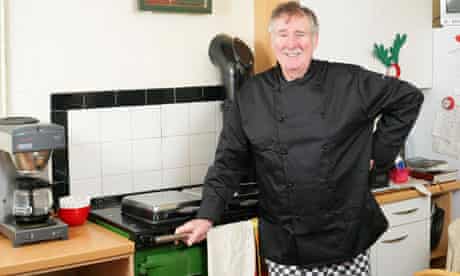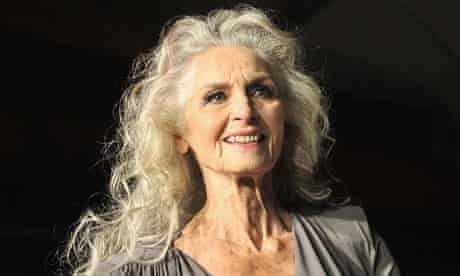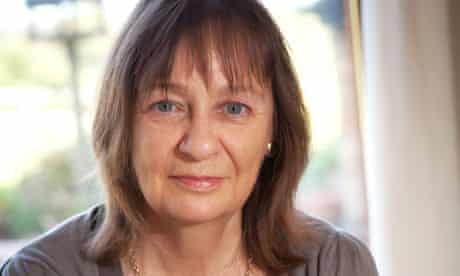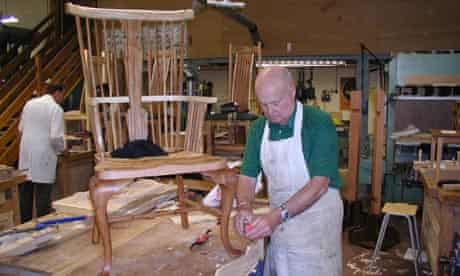Will I Live My Life Again
Chemist to standup
Julie Kertesz, 77, London
When I was a child, I loved writing. At 10, I started writing a diary and never stopped. By the time I was 14, I had written my own plays, but my parents wanted me to be a‑chemist. I was living in a communist country where you couldn't write what you thought, so maybe they were right. But it was‑still always my dream.
We were Hungarian but lived in Transylvania [in Romania] until I was 14, when we moved to Bucharest. I wasn't allowed to go to university – the government wouldn't even let me apply because my parents were middle-class and not workers. Instead, I went to work as a chemical technician when I was 18 and after a while was allowed to do a degree via a correspondence course. I had a real thirst to learn and didn't stop until I got my PhD. I got married at 27, and my husband didn't like me studying, because he didn't have a degree.
We moved to France, where we had two children and I worked as a research chemist. I got divorced when I was 41 and moved with my children to the US.
When I returned to Paris I started selling computer products and worked at the National Conservatory of Arts and Crafts looking after the 500 Apple Macintosh computers. At 55 I met the man who I believed to be the love of my life and we married. I was more or less pushed out of my job, because of office politics. I was 60 and very sad. I decided to translate my diaries. I went to a women's group, who helped me. I put my diaries on the web and started a French blog called There is Life After 70. When I was 70, my husband met another woman. My son moved to London for work and, as I was freshly divorced, I came too. I was 74.
I discovered something even better than writing stories – I found I could tell them. I joined Toastmasters, a non-profit organisation that helps with public-speaking skills. I became a storyteller and now speak at Spark London, a monthly event at the Canal Cafe in north London.
A year ago I was telling a story about how I changed my profession, and people in the audience began to laugh. So I went to a standup comedy workshop. It was all young boys and it was the worst thing – and then the best – that could have happened. They looked at me with shock. But when I said to them: "Why the fuck am I doing this shit at my age?" they laughed and accepted me. I had never spoken like that before. Now I go almost every week to do standup at the Laughing Horse, Cavendish Arms, Jester Jester – and they love me. It was frightening at the beginning, but I decided I had to try something new every time. I have only been heckled once.
I coach people in storytelling too and I recently won a Toastmasters International gold award for being an advanced communicator. It gives confidence to people who are 50 to see I am still alive, writing my blog, taking pictures and storytelling. I feel younger now then I felt at 70 or even 65. Somehow then I felt my life was finished and now I feel there's so much I can do to help people.
Changing your life at 60 is very important. I recently took part in the Silver Stand Up of the Year: Die Laughing competition for people over 55 – and I won their newcomer award.

Horticulturist to chef
Frank Finlay, 67, Northern Ireland
My first job was as an apprentice fitter in Belfast. I was just 16. But before I was 18 I had realised it was not for me, so I joined the army, the Royal Engineers. I was there for six years.
I really enjoyed it. We built bridges and roads, and I was a plant, or bulldozer, operator. When there was nothing for me to do I helped in the kitchen tents. On my father's side, all the boys could cook. It was always in my head to enjoy food, but I never thought of becoming professional.
After I left the army in 1969, I worked for a while in a chemical factory outside Cambridge. On night shifts I thought: "This working inside is going to kill me." So I applied for a job as a groundsman. I did several exams and married my first wife in 1972. We had a son, who is 38 now. My marriage broke up, and in 1984 I came home to Northern Ireland. I applied for a job as a park supervisor and finished as park manager. I liked not being stuck in an office. I took early retirement at 59, but no way could I just take it easy – I would die.
The nicest thing about being this age is you have quite a bit of life knowledge behind you, so you don't make a mess of too many things. At 60 you shouldn't be calming down – your mind is still racing. If I just did the garden that would only take two or three hours a day. So where do you go? The pub? Golf? I like fishing, but there's only so much you can do. You need a little job.
I trained to be an assessor for horticulture at the local technical college and I started to teach. I resurrected the horticultural class at the local high school, which had stopped 15 years before. I was 61 by then and teaching 14-year-olds, but I really enjoyed it. One day a week I also taught horticulture at a society for people with learning disabilities. I have never enjoyed myself so much.
By this time I was doing 19 hours of teaching – plus preparing lessons. It was becoming another hard career. Five years ago, I married again. I also started helping out a friend at the coaching inn she had taken over, doing breakfasts. I did them from 6.30am and could be at the college by 10.30am.
I got it into my head that the kitchen was the place for me. I was never worried I was too old. It was just the joy of doing something different. There used to be some banter in the pub next door: "Aye, another wannabe cook." I laughed, but it's always handy to have a qualification. That's why, four years ago, I went to do my City & Guilds Level 2. I was with 17- and 18-year-olds.
You can't work as hard at my age as you can when you are young. But you have other skills. I first did City & Guilds when I was a teenager, and two years ago, 50 years later, I got my cooking ones. City & Guilds gave me a gold medal of merit – which was the biggest thrill of my life.
I still do the breakfasts six mornings a week. I am thinking of moving away from this in a year. The minister's wife here has set up an orphanage in Rwanda, and she has asked me if I want to go. I could do a bit of gardening or teaching horticulture. If they need a toilet, I can build that.
I would suggest people do something new at 60 every time – something they have always wanted to do. I would rather go for something than sit and look out of the window.

Film extra to model
Daphne Selfe, 83, Hertfordshire
After school, I worked in a riding school, but by the time I was 20 I was working in the coats section of a department store in Reading. One day, some models came down from London to do a show, but they were one short, so they asked me to step in. I had done a photoshoot for a local photographer before, but I had never been in a fashion show.
The other models told me I should try getting more work in London, and Mummy thought it was a great idea. So I went to do three weeks' training – everyone did modelling training back then. I started freelancing after about 18 months, and I did quite well. I started dancing too. I learned ballet, tap, Latin American and modern. Buddy Bradley had a little company that I joined. We danced on TV shows, and I got to travel. During this time I met my husband, Jim. We had three children.
I didn't think I would work after that, because in those days you didn't really after you got married. I started doing some extras work though – because my husband wasn't earning a great deal. He was a studio manager and a director. In the end I did about 400 films – crowd scenes and sometimes walk-ons. Golly, it was fun. I did occasional modelling work too, but in the 60s and 70s they didn't really want my look; they wanted women like Twiggy.
When I was 69, my husband died, and about a year after that my agent called and asked me to walk in a London fashion week show for Red or Dead. I was very surprised, but it stopped me moping at home. I wasn't scared because I had done it before, and it was very good fun. The other models were fascinated by me. I was no threat to them so they just thought: "I want to be like that when I am older." The stylist recommended me to Vogue and I was scouted by [agency] Models1. After that I was flavour of the month.
Modelling is the same at any age; you have to work hard, be on time. But when you are older you feel more confident; you don't care if you don't get a job. You just realise you aren't necessarily what they are looking for. You laugh and leave it. But that is more difficult for young girls.
When my friends turned 60, a lot of them learned a language or did more travelling, but I have never had a lot of money so it was modelling that allowed me to do that. Last year, I went to Berlin, Paris, Prague, Beijing and Ibiza.
People think you earn a lot of money as a model; you don't. But I am just happy to work; it's good to use your mind. And I am all for trying something new. I have my physical limitations – I can't wear high heels now, for instance. But in my mind I am about 35.

Education manager to entrepreneur
Carolyn May, 61, North Wales
I live near Ruthin and worked at a further education college in Wales for 26 years. I was an A-level teacher, then head of department, head of faculty and, finally, professional development manager – managing and teaching on the training courses. I really enjoyed it. But I started feeling frustrated that I couldn't take on new opportunities because I was working full time.
Because of education cuts, all the senior managers were offered voluntary redundancy, so when I was 58 I took it. I was really attracted to the idea of being an entrepreneur. I wanted to set up a company to help older people change direction – either as a lifetime change or because of redundancy. Employers may not voice their concerns, but they may choose someone younger because, for instance, they feel older people are more likely to be ill or that they may leave in three or four years' time. One of my old managers was 65 and could not get another job, but he said to me: "I have so much left to offer." And that was where the name of my company came from, Still Much To Offer.
I went to London to the Recruitment and Employment Confederation and retrained. It's very difficult to make money from helping older people, as I give out a lot of free advice and support, so I have a business-to-business side too. I recruit for companies and also do training.
There needs to be more education for older people. People think the brain deteriorates with age but we are capable of making new neural connections throughout our lives. Our short-term memory might be affected, but this can be dealt with using new learning methods.
I wasn't frightened when I started my company. I was well-qualified – and it may have been naivety, but I thought it was up to me to make a success of it. It hasn't been easy. I knew some of my weaknesses, but I didn't realise I would find sales and marketing so difficult. There were a lot of personal challenges and it took time to adjust.
It's a fabulous time to change things, though. It's like a second chance, a new beginning. You are just like someone starting out in their 20s. You get employers who think younger people will be more enthusiastic and find challenges easier. But older people are often looking for something new to do and want a new challenge.
Also your children are older, you don't have childcare issues, and if you take voluntary redundancy at that age you might have a financial cushion. I have four children. One of them is still at home and he was 17 when I took redundancy. The website went up in April and I hit 60 in July. But it's very good to face challenges when you are older – it keeps you physically and mentally active.
Changing employment culture is going to take time, and it won't come just from the job market, but also from the media. If Alan Sugar did The Apprentice for older people, I would love to be on it.

Teacher to furniture maker
Wyn Sheryn, 76, Lancashire
I grew up knowing I would be a teacher. My mother drummed it into me that if you are a teacher you have regular pay and a regular pension, and if you are off sick you are still paid. My father had a shed with tools, and I was always hammering and making things in there. I have always done DIY – making doors, making beds. But I never thought about doing it for a job, because there was no security in it.
I trained as a music teacher and started teaching in 1958 when I was 23. Soon after, I married my wife Mary. We have three children. I quickly became disenchanted with teaching music, however, so I retrained as a PE teacher. I did that for 10 years and I loved it. They were the happiest days of my life. But I was still poor.
Teachers were hopelessly paid. I had to work in the holidays. One summer I drove a refuse cart. I spent another painting the local fire station to give our family a decent life. And I was ambitious: I didn't want to be in a tracksuit when I was 50, so I went to work as a county education adviser in Shropshire. I ran courses in rock climbing and canoeing for teachers – until my wife pointed out one day that it was the 12th weekend in a row I had been working. So in 1971, when I was 36, I moved to Peterborough and, using my background in sports and music, helped plan the new town. After that I moved to Preston and became the director of leisure services, then took up the same role in Lancashire. Finally, in 1988 I took a severance package and retired at 52. But I'm not the kind of person to retire. So for the next four years I worked at the Central Lancashire business school.
When I was 56 we went to New England on holiday and I had an epiphany. We went to look round an old Shaker town. They were great inventors and amazing furniture makers. They had a lovely work ethic: "Hands to work and hearts to God." Their furniture is exquisite. When I saw what they could do with a plank of wood, it took my breath away. I thought, that's what I have to do.
I went to Burnley College and, between 1993 and 2009, I did every City & Guild course under the sun. They gave me a silver medal and a lifetime learner award. Now I have a great time making furniture in my workshop.
I made my son and my daughter dining tables for their weddings, and at the moment I am making Windsor chairs. I fix things for people, often antique furniture, and I make bits and pieces. I don't do it for the money. But if you have never worked with wood it's the most wonderful thing in the world. If you split open a timber, you are the first person to see the inside of that tree for 100 years. I can't wait to get in my workshop every day.
I'm so glad I have done something new. You can never challenge your brain enough. Do I wish I had done it sooner? Well I wouldn't have been able to afford to – but now I have a lovely lifestyle. So it turns out, my mum was right.
Source: https://www.theguardian.com/society/2012/jun/04/change-your-life-at-60
0 Response to "Will I Live My Life Again"
إرسال تعليق